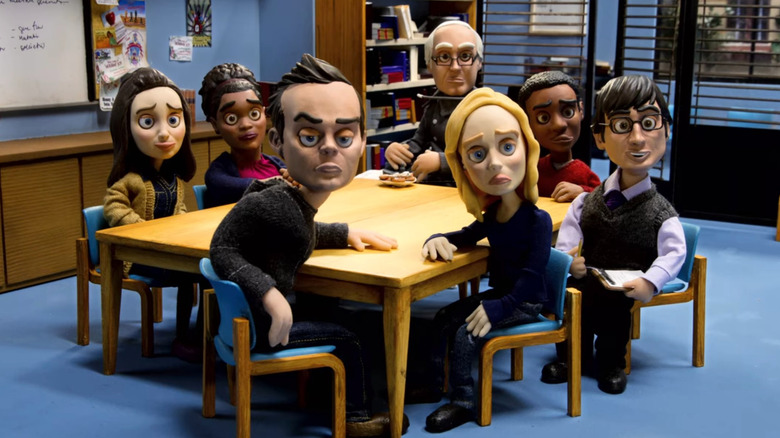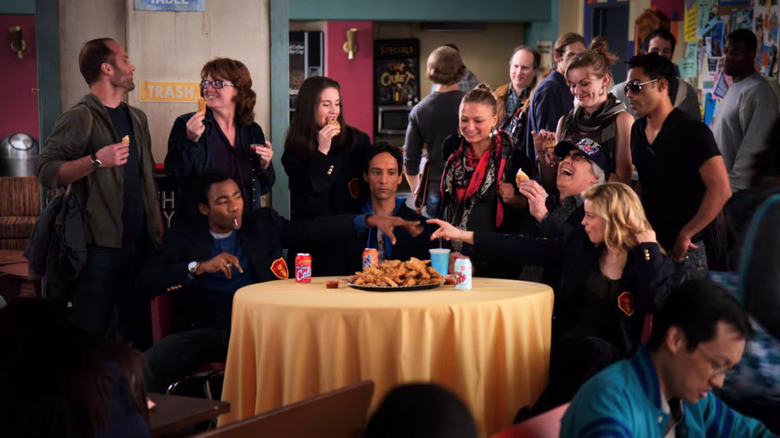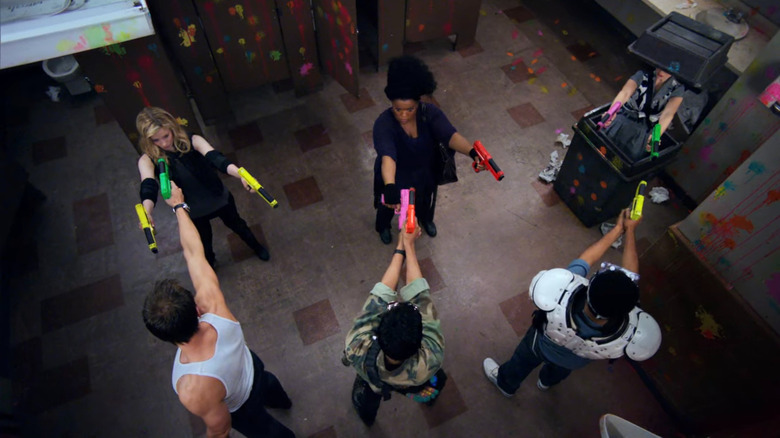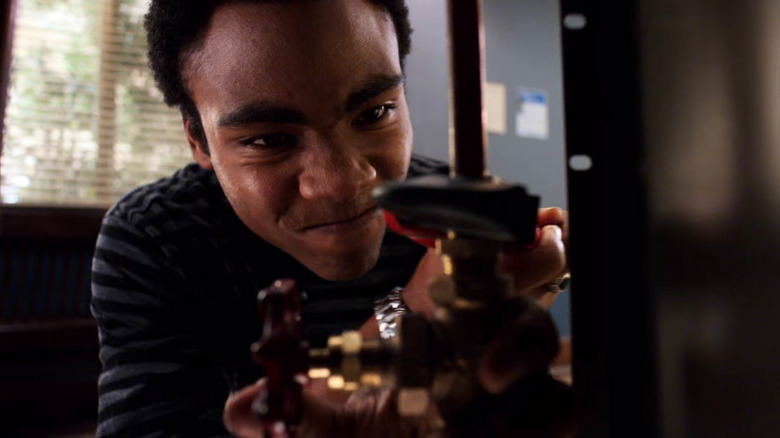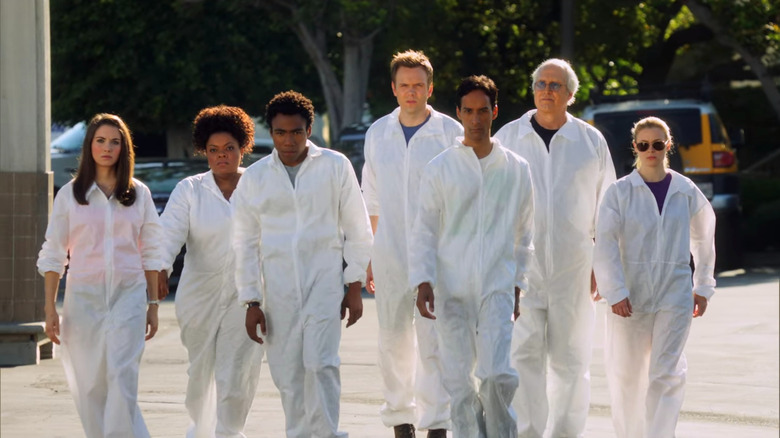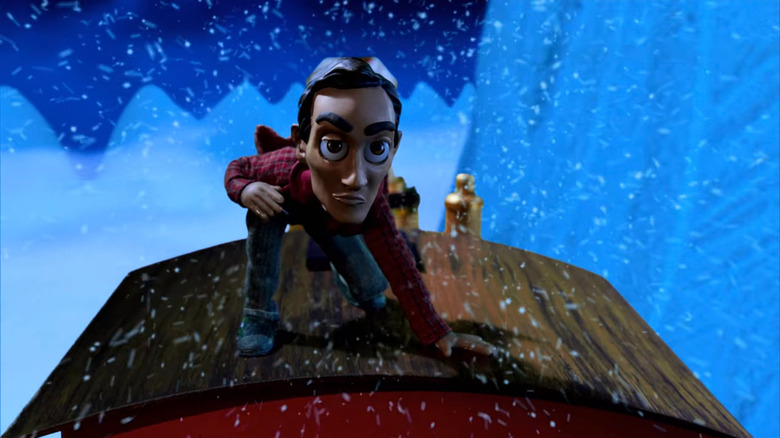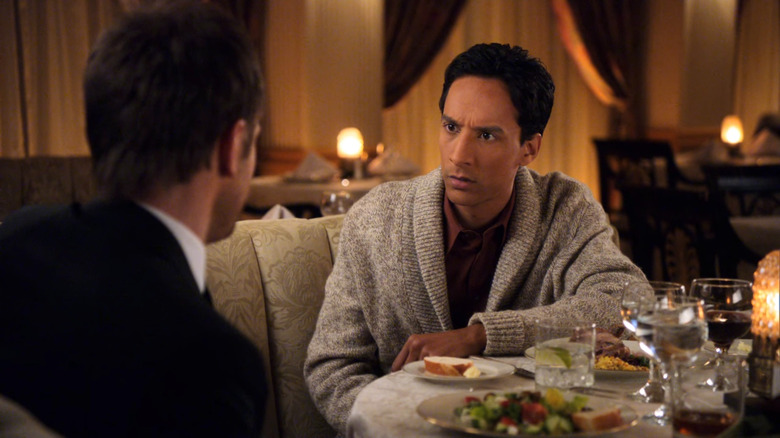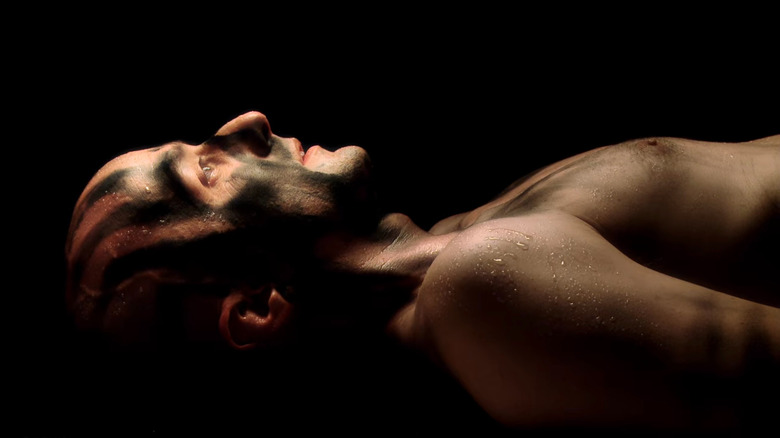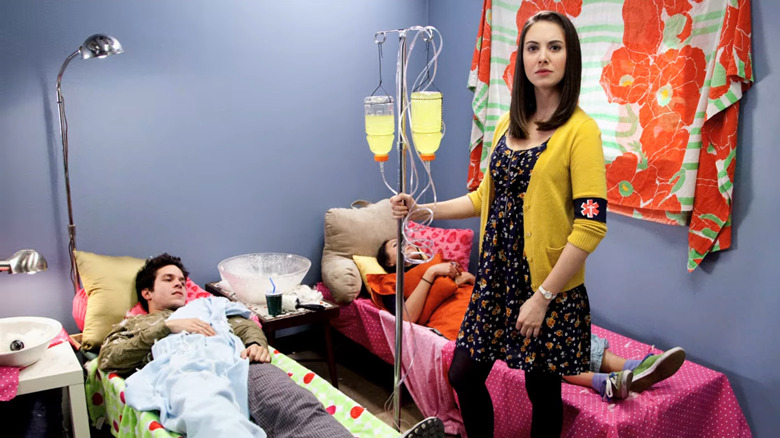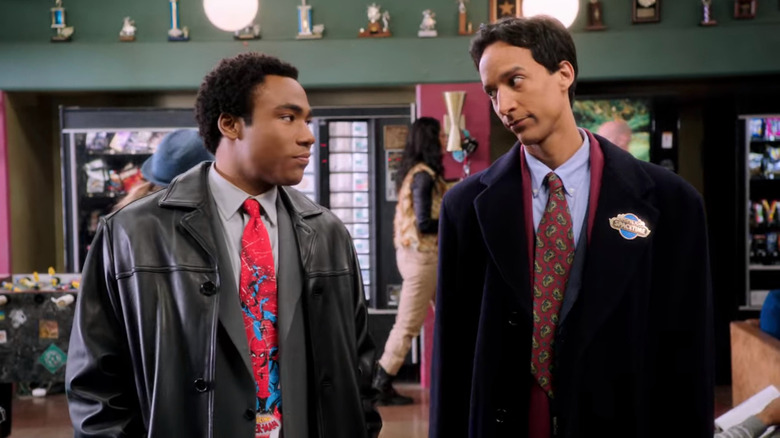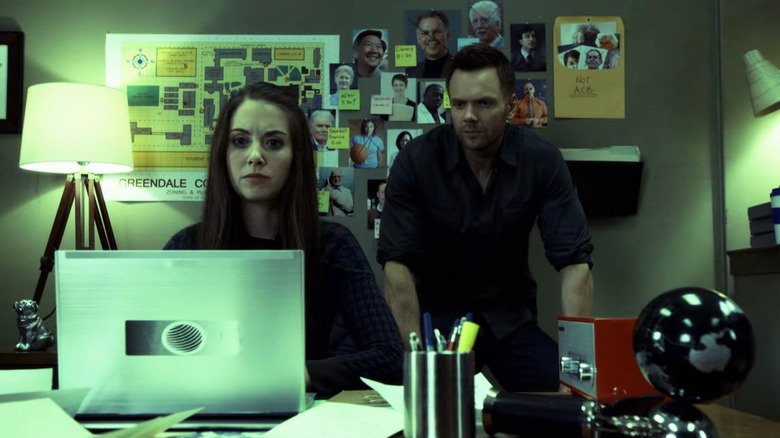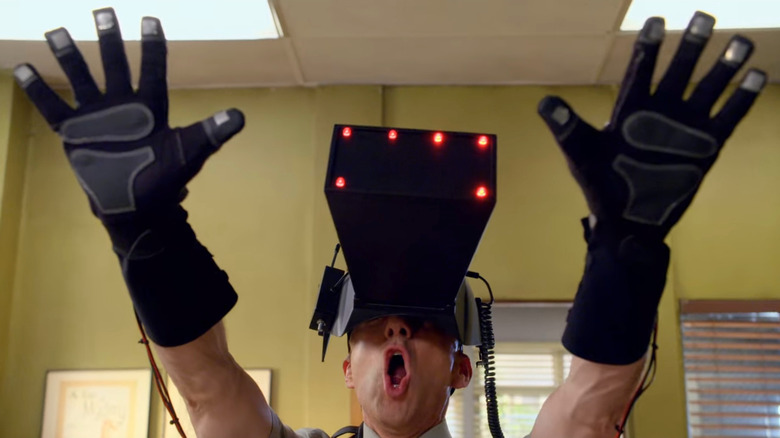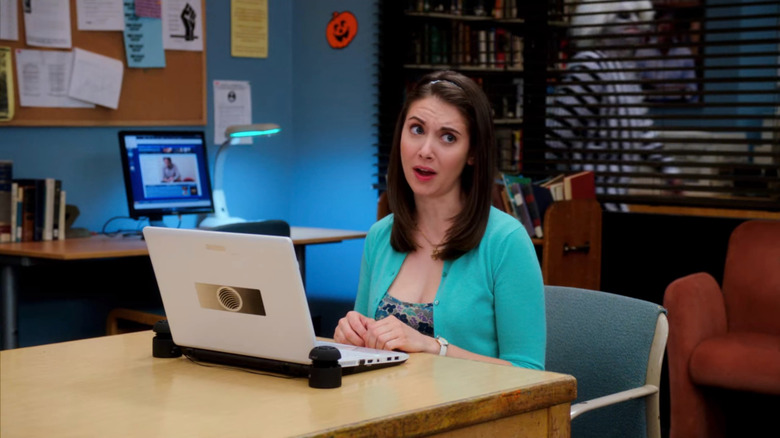Breaking Down The 12 Best Pop Culture Homages In Community
Our pop culture landscape is saturated with self-awareness and homage. Frankly, it can be a little exhausting to watch an endless amount of movies and television shows indebted to pulling back the curtain to show you how what it's doing relates to another piece of media. What makes it even more annoying is how they basically all pull from the same small selection of cultural touch points and think they are novel by doing so. It's gotten to the point where these major touch points, like "Star Wars" or "Ghostbusters," now just make new things that exist to self-reflexively talk about their own franchises. Very rarely do these references go beyond, "Remember that?"
But then there's "Community," a show that rose to fame precisely because of its frequent usage of pop culture references. From its very first episode, Dan Harmon's story of a collection of community college misfits was ensconced in film and television parodies and homages. The show is constant conversation about its place in the television landscape, the genre and formal conventions of the sitcom, and how movies and television have become touchstones for people's personalities and help them understand the world around them. While "Community" uses plenty of references for purely comedic purposes, its relationship with pop culture always is in perfect sync with its characters (minus the gas leak year).
With this piece, I want to spotlight a dozen of the finest pop culture references in "Community." A couple of ground rules: To spread the wealth, the maximum number of episodes per season that can get a spot is three. Also, only one paintball episode. These are the episodes that took "Community" from fervent fanbase to obsessed cult, and including them all would be cheating. Let's get started then!
Goodfellas (and other Mafia movies)
The first season of "Community" eased its way into working with parody and homage. As with any show, it needed to find its footing, its tone, and its character before it could really start messing with the form in a major way. It was not until the 21st episode until they were able to do a full-on, episode long riff on a specific film. In this case, "Contemporary American Poultry" sets its sights on Martin Scorsese's masterpiece "Goodfellas," along with a number of other Mafia movies. The cafeteria starts serving chicken tenders so good that people run everyday to lunch to try and get them before the limited quantity runs out, and Abed and Jeff concoct a scheme to essentially seize the means of production and distribution, creating their own chicken finger mob.
A crucial element to why "Community" can so easily swerve itself into all of these different genres is Abed. This character exists somewhere on the spectrum (the show never clearly defines what Abed's conditions are), and the way he manages to get through the world is by seeing it as a movie or episode of television. His imagination and commitment to the piece of media usually acts as the gateway to explore these genres and spirals out to encompass all of the other characters as well. In "Contemporary American Poultry," it uses Abed's rise of appreciation amongst his peers due to his ability to procure chicken fingers as a way to look at the power dynamics and jealousy within friend groups and how easily some people can be taken advantage of because of them. It's goes far beyond Abed just saying in voiceover, "As far back as I can remember, I always wanted to be in a Mafia movie."
Die Hard, The Warriors, John Woo films, etc.
The paintball episode I am choosing is the very first one. "Modern Warfare" truly changed the game when it comes to what people think about "Community." It even changed the expectations of the show, as "Community" would go on to make several more paintball episodes to try and recapture the magic. They came somewhat close with the two-part season 2 finale "A Fistful of Paintballs" and "For a Few Paintballs More," but "Modern Warfare" still reigns supreme.
This episode is "Community" at its most playful. Instead of taking one movie or genre to tackle, they throw everything at the wall they can. The desolation of post-apocalyptic movies, the stylized gunplay of John Woo, direct shout-outs to "Die Hard" and "The Terminator," and so much more make this episode that runs just over 20 minutes long a wonderful, chaotic, hilarious playground. Justin Lin, best known as the director behind most of the "Fast and Furious" franchise, turns Greendale Community College into a war-torn hellscape of paint, and the sincerity with which this ridiculous premise is played demonstrates how perfectly the show has designed itself to never lose its heart even in the silliest of situations.
If you picture "Community" in your mind, the first episode most people will think of will either be this one or season 3's "Remedial Chaos Theory," and that's with good reason. Even today, this remains a truly stylistically bold sitcom episode, and back in May of 2010 when it first aired, this kind of thing was basically unheard of, especially on American network television.
Good Will Hunting
Usually, "Community" uses a piece of pop culture for celebratory purposes, as they clearly love the movies and shows they are working with. Sometimes, though, they want to use the show as an opportunity to critique and deconstruct a piece of art and think about it in a new way. In the penultimate episode of Season 1 called "English as a Second Language," the target is Gus Van Sant's "Good Will Hunting."
Part of it is purely for parody purposes. Having Troy be a Will Hunting-esque savant — but for plumbing, not math — is a really funny idea. The gag of him walking up to the chalkboard in the hallway and putting the piece of chalk into his pocket is pure gold. But then the episode wants to examine how that film views friendship. Ben Affleck's Chuckie has grown frustrated with Matt Damon's Will choosing to live his life without reaching his intellectual potential, despite the fact that he is a brilliant guy. He says that one day he hopes to go pick up Will for work and he won't be there, going on to finally live his life.
Abed, seeing the parallel with Troy, makes the same speech. However, Troy is rightfully offended by this comment. It comes off as someone saying they don't want to be friends anymore, and because the Troy and Abed relationship is so strong and crucial to the show, Abed making this reference feels like betrayal, even if it is a funny scene as played. It's a moment that both deepens Abed's understanding of people and strengthens their bond when they come out of the other side of it. The big episodes get the attention, but it's the smaller uses of pop culture references like this that make "Community" special.
Apollo 13 and The Right Stuff
Like "Modern Warfare," much of the reasoning behind the parody in the fourth episode of season 2 "Basic Rocket Science" is to have a lot of fun with the sitcom form. Transforming this show for 22 minutes into a space survival thriller à la "Apollo 13" seems like the kind of thing that could never work. However, what both this show and that genre have in common is their reliance on a group of individuals coming together to grow as people and overcome adversity as a collective. Yes, in this case their adversity is escaping from a Kentucky Fried Chicken themed mock spaceship, but the sentiment remains.
The emotional core of this episode is that Annie has decided that maybe she will leave Greendale to attend a rival community college, and through this coming together to get through a situation that Annie ostensibly caused (as she recommended the college stealing the mock spaceship), they realize how strong they are as a unit, and Annie understands how important these people are in her life.
This is also the episode that gives us Greendale's flag ... which looks like an anus.
Rankin/Bass Holiday Specials
The most organic uses of pop culture within "Community" almost always relate to Abed. As he is a character whose thoughts and feelings are not immediately accessible for him, constructing an episode around a movie or TV show allows him to process what troubles him. No episode does this better than "Abed's Uncontrollable Christmas," which is done in the style of the classic Rankin/Bass stop-motion animated Christmas specials like "Rudolph the Red-Nosed Reindeer" and "Frosty the Snowman."
By embracing an art form and style that is used primarily for entertainment for children, it allows "Community" to be emotionally at its most simple and elemental. Abed is coming to grips with the fact that his parents have split up with his mom becoming decidedly absent from his life. Growing up, he and his mom would watch the Rankin/Bass specials during the Christmas season, and by escaping into one in his mind, he thinks he will be able to trick himself into believing that everything is as happy as it was back then.
The episode does mine some comedy with the style, but really, this homage is purely for enriching character. Sitcoms are rarely afforded the opportunity to delve this sincerely into the show's emotionality. Sentimentality is the stock and trade of the sitcom, and "Abed's Uncontrollable Christmas" avoids that entirely. This is raw, honest emotion presented as sweetly as possible. One of the show's unequivocal triumphs.
My Dinner with André
When "Critical Film Studies" was being advertised, it was the "Pulp Fiction" episode, which would have been catnip to the "Community" fanboys. It is that, kind of. The study group throws a birthday party for Abed themed to "Pulp Fiction," where everyone in the cast is dressed up as a character from the movie. However, in practice, this is not a "Pulp Fiction" episode. This episode pays homage to a personal favorite film of mine, Louis Malle's "My Dinner with André."
For those who have not seen it, "My Dinner with André" is about character actor and playwright Wallace Shawn having dinner with avant-garde theatre director André Gregory. That's it. That's the movie. The two play themselves and discuss art and life from just about every conceivable angle you can imagine over dinner at a fancy Manhattan restaurant.
This is an instance of Abed wanting to dive into a piece of pop culture but not necessarily to delve into his feelings. No, this ends up being a way to dig into the innermost troubles of Jeff, though this was not Abed's intention when donning the persona of the genial, thoughtful André Gregory. He was just hoping to have a night reenacting a movie, but the nature of that movie necessitates digging into the psychologies of those in the conversation. And because "My Dinner with André" is not exactly in the major popular consciousness, Jeff believes he is having an authentic, emotional breakthrough of conversation with his friend. Danny Pudi plays the silent reaction to realizing Jeff is actually just spilling out his deepest insecurities to perfection. I know there's probably folks who wanted a "Pulp Fiction" episode, but this is far more interesting an homage.
Hearts of Darkness
After showing himself to be an invaluable member of "Community" for the first two seasons as Greendale's costume-wearing, incredibly needy Dean, Jim Rash was finally upgraded from a recurring to a regular cast member in season 3. He had significant stories beforehand, but "Documentary Filmmaking: Redux" is the first that makes the Dean the center of the action. The best way they found to explore the many complex issues swirling around in his head is by turning him into Francis Ford Coppola shooting "Apocalypse Now," as depicted in the documentary "Hearts of Darkness: A Filmmaker's Apocalypse."
Making "Apocalypse Now" essentially turned Coppola into an egomaniac who utterly lost his mind, and the same thing happens to the Dean when he tries to shoot a new commercial for Greendale. The key to so many characters on "Community" is their insecurities. Nearly every character, on some level, puts up some kind of a mask to shield their self-loathing and feelings of inadequacy to the rest, and by giving the Dean this much power and authority, it gives him a mask that doesn't fit, making him a menace to everyone around him. He is a man always taken down a peg who desperately wants to be loved, and this episode flips that on its head, bolstering his ego in ways that it has never been before. I mean, he even got Luis Guzmán to be in the commercial! That takes strength! Of course, it all comes crashing down, in a beautifully tragic and hilarious way.
"Documentary Filmmaking: Redux" is a spiritual sequel of sorts to an episode the previous year that lampooned the mockumentary. That episode's target was more the prevalence of that format for the sitcom at the time, and this takes it to a whole other level.
Ken Burns documentaries
From one documentary homage to another, "Pillows and Blankets" is perhaps my favorite parody episode of the series. This episode is done in the style of the fantastic documentaries directed by Ken Burns, most notably the nine-part series "The Civil War." Filled with pans across still photographs, voiceover narration of e-mails and text messages, and occasional fly-on-the-wall documentary footage, this is about as pitch-perfect parody of those documentaries as you can get. And they make it about one of the silliest ideas the show has ever had: a war within Greendale where half of the people are on the side of blankets, led by Troy, and half for pillows, led by Abed.
Yet again, though, the parody is not just for parody's sake. Equating this silly battle with something as consequential and important as the American Civil War really drives home the stakes at play in this rift in the friendship between Troy and Abed. The second those two got paired up together for the end of the episode tag in the show's second episode they became one of the most important units of the show. "Pillows and Blankets" shows them at their lowest and gives their struggle the proper respect it deserves. Same with their reconciliation. The homage is elevated to an even greater degree because they brought in legendary character actor Keith David to narrate the episode (who would go on to actually join the cast in season 6). David also narrated Ken Burns' own "Jazz," and his beautiful, commanding bass-baritone helps turn what could just be a fun idea into something really meaningful.
Law & Order
I have spoken a lot of using parody and homage as a way to dig deeper into its characters. They don't all have to be that way, though. Sometimes they can just do a parody because it would be a fun thing to do. Such is the case with "Basic Lupine Urology," which puts the study group in their own version of "Law & Order" investigating a sabotaged science project yam.
The gags here are simply stellar. You have Troy and Abed trying to out one-liner each other, Fat Neil randomly moving files and boxes as he is being questioned, and special guest star Michael Ironside swinging in to play a gruff military lawyer in a courtroom face-off with Annie and Jeff. It also gets to bring in Michael K. Williams as their science teacher, who sadly was not as utilized throughout season 3 as he should have been. "Basic Lupine Urology" sets out to be a fun episode of television and succeeds tremendously.
David Fincher and serial killer movies
We are just going to skip right over season 4 and go to season 5. I knew you didn't mind. As the show got into its later seasons, it leaned less into the full-on parodies and more on the meta-textual elements of "Community" itself. They also just had less of a budget and fewer episodes to work with per season. Taking time out to do big scales homages weren't the chief priority anymore. When they did do them, particularly in season 5, they were essentially spiritual successors to previous episodes. "Basic Intergluteal Numismatics," like the aforementioned "Basic Lupine Urology," is an investigation episode, but instead of "Law & Order" being the guide, it is the nastier work of David Fincher and the greater world of serial killer cinema.
What are the study group investigating? Obviously, it's the "Ass-Crack Bandit," a notorious member of the Greendale community who slides quarters down people's exposed cracks when they bend down. Also like its predecessor, this episode is just meant to be silly. This was the final episode of the series that Donald Glover shot as Troy (the two that aired after this were shot before), and it is quietly one of his funniest performances of his run on the show. Troy is so often an upbeat, exuberant personality, and when he falls victim to the Bandit, seeing him draped in an abundance of blankets and in a wheelchair is comedic gold. I am glad his time on the show got to go out on a high note for him.
The Lawnmower Man
If season 5 scaled back its full scale homage episodes, season 6 all but eliminated them. When they moved to Yahoo! Screen, "Community" really did become a show about its status as a television show, which it mined brilliantly, in my opinion. I think we don't speak highly enough about season 6 of "Community" for the simple fact that not enough people have seen it. In "Lawnmower Maintenance and Postnatal Care," the second episode of the final season, we get to revisit the Dean's ego when given power that "Documentary Filmmaking: Redux" introduced. The Dean makes an unwise financial decision for the school and buys this elaborate virtual reality machine for the school, which he then uses exclusively himself.
Taking a page out of the 1992 sci-fi picture "The Lawnmower Man," the Dean quickly develops a god complex while using the machine, refusing to disconnect from it and wanting to mold the virtual world to his whim. Sure, all the Dean is doing are things like changing the operating time zone, but it still gives him the rush of total control, often exclaiming, "And Jesus wept!" I am always in favor of showcases for Jim Rash as the Dean, and this is one of the best ones.
Beetlejuice
This one is just fun. Someone realized that in the Halloween-themed episode from season 3 "Horror Fiction in Seven Spooky Steps," the show had used the name "Beetlejuice" for the third time. Per the rules of the ghost with the most, he appears if you say his name three times. So, when Annie says it, they had an off-brand Beetlejuice (for legal reasons) walk by in the background. That is some serious commitment to the bit.
I could have chosen so many more episodes of "Community" to spotlight, which included loads of fan favorites and classic episodes, but I feel these 12 — well 11, really — give an idea as to how uniquely Dan Harmon and his collaborators elevate the art of parody and homage into something that connects to a person on a much deeper level than one could think. Now, we can wonder what the announced follow-up film will have in store in terms of homage.
